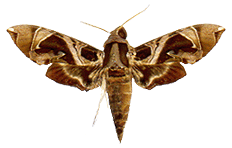|
Daphnis hypothous Cramer
Sphinx hypothous Cramer, 1780, Uitl. Kapell., 3: 165.
Deilephila hypothous Cramer; Rothschild & Jordan,. 1903: 509.
|

Daphnis hypothous

(.65
natural size)
|
Diagnosis. This species could be confused with D. nerii Linnaeus which has
been recorded from Peninsular Malaysia and Sumatra, but not yet from
Borneo. Both are illustrated by Diehl (1980). D. nerii is somewhat paler,
a brighter green, with a more quadrate basal zone on the forewing, a less
symmetrical subtornal zig-zag to the postmedial, and no strong white spot
at the apex.
Geographical range. Indo-Australian tropics to Vanuatu.
Habitat Preference. The species is abundant at all altitudes, coming
mostly to lights set in open situations. It was taken in numbers at 2600m
on G. Kinabalu (Holloway, 1976).
Biology. The larva (Bell & Scott, 1937; Dupont & Roepke, 1941) is
green with a yellowish white dorsolateral streak that is edged darker
green dorsally. There is a strong blue ocellus on T3 just below the line,
and a series of six oval blue patches in a similar position on segments A2
to A7. Below these markings there are broad, oblique dark green bands the
slope counter to that of the normal sphingid lateral oblique stripes.
Recorded host-plants (Bell & Scott, 1937); Dupont & Roepke, 1941;
CIE records) are: Alstonia (Apocynaceae); Anthocephalus, Uncaria
(Naucleaceae, aff. Rubiaceae); Cinchona, Ixora, Pavetta, Wendlandia
(Rubiaceae).
<<Back
>>Forward <<Return
to Contents page
|

